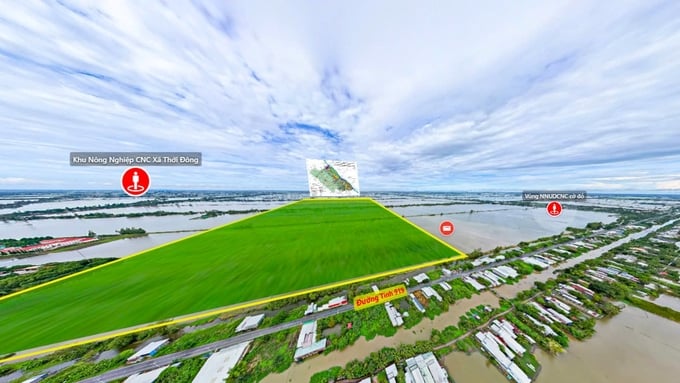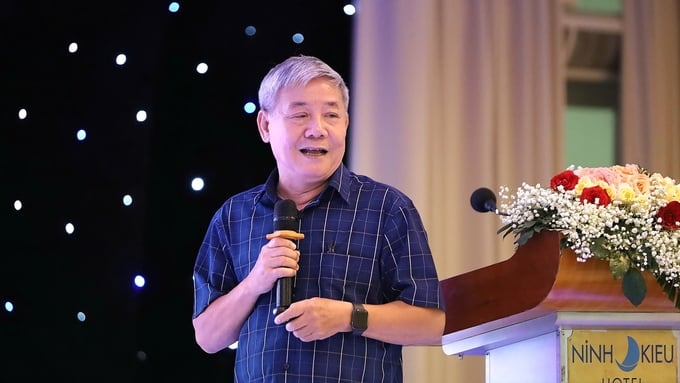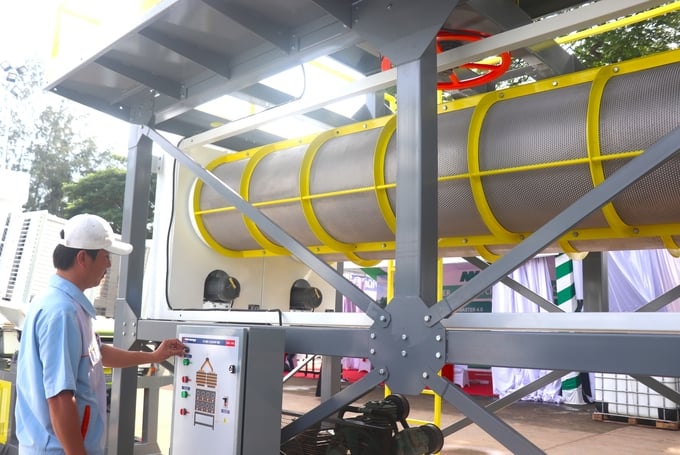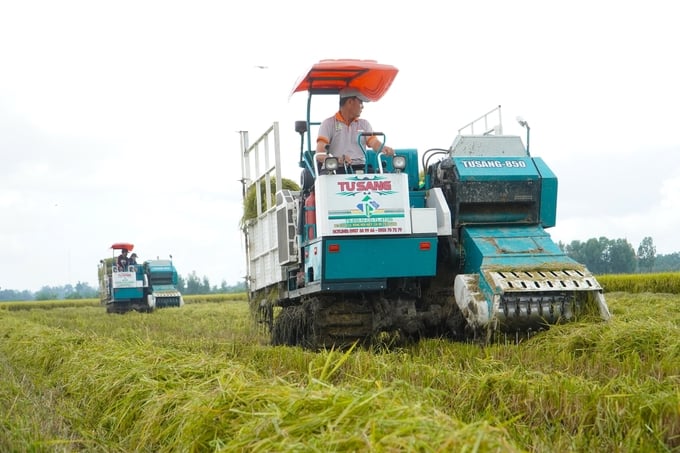November 27, 2025 | 00:31 GMT +7
November 27, 2025 | 00:31 GMT +7
Hotline: 0913.378.918
November 27, 2025 | 00:31 GMT +7
Hotline: 0913.378.918
On November 1, the Department of Agriculture and Rural Development of Can Tho city held a conference to announce the integrated agricultural sector plan into the master plan for Can Tho city for the period 2021-2030, with a vision to 2050.
One of the important contents of the agricultural development direction for Can Tho City during this period is the establishment of 7 high-tech agricultural zones in the districts of Vinh Thanh, Co Do, and Thoi Lai, covering an area of approximately 1,665 hectares.
These projects will be included in the priority investment list for the city from 2022 to 2030, with a total investment call of over VND 5 trillion.

Illustration for the investment locations of high-tech agricultural zones in Can Tho city. Photo: Kim Anh.
Can Tho city will reorganize the existing Can Tho high-tech agricultural zone, covering 244 hectares in Co Do district.
Additionally, 6 new high-tech agricultural zones will be planned in the communes of Thanh Tien, Thanh Loi, and Thanh Quai (Vinh Thanh district); Truong Xuan and Dong Thuan (Thoi Lai district); and Thoi Dong commune in Co Do district, with a total area of over 1,400 hectares.
Moreover, Can Tho City will allocate approximately 11,500 hectares for the development of infrastructure in the high-tech agricultural area at the Co Do Agricultural One Member Limited Liability Company and the Hau River Agricultural Farm.
Recently, the Department of Agriculture and Rural Development of Can Tho City conducted a review of the legal procedures, land location for building high-tech agricultural zones, as well as identifying affected households and referencing land prices to establish a suitable plan.

Dr. Nguyen Trong Uyen, former director of the Institute of Agricultural Planning and Design, proposed some solutions for Can Tho city to develop high-tech agriculture. Photo: Kim Anh.
Dr. Nguyen Trong Uyen noted that currently, high-tech agricultural models are still small and fragmented, making it difficult to encourage and scale them up.
While several high-tech agricultural zones have been established across the country, their operational efficiency has not been high.
In Can Tho city, businesses investing in agriculture represent a very small proportion, and the city currently lacks recognized high-tech agricultural zones or regions. The scientific and technological capacity and innovation potential of most enterprises are also weak, as most are small and micro-sized.
Particularly, the infrastructure serving high-tech agriculture, especially the logistics system for the production and consumption of agricultural, forestry, and fishery products, is not well-coordinated. Consequently, transportation and preservation costs for agricultural products remain high, making it challenging to compete with similar products from countries like China and Thailand.

The call for enterprises to invest in high-tech agriculture in Can Tho City is still limited. Photo: Kim Anh.
From these realities, Dr. Nguyen Trong Uyen suggested that to plan and attract investment in high-tech agricultural zones in Can Tho City, it is necessary to build and upgrade infrastructure in the zones, particularly transportation and electricity systems within and outside these areas. This will create conditions for investors to reduce input costs and expand their output markets.
Additionally, Can Tho City needs to prioritize attracting large-scale enterprises that can play a core role in leading and developing production and consumption linkages.
Subsequently, high-tech agricultural zones should be established step by step, with each sector (crops, livestock, aquaculture) establishing only one zone, prioritizing those with high potential and investment attraction capabilities to start operations first, then learn from experiences. When the occupancy rate of high-tech agricultural zones reaches 60-70%, new zones can be considered.

By 2030, Can Tho's agricultural sector still has room to develop a rice production area of 48,000 hectares. Photo: Kim Anh.
Can Tho city should continue to build special policies, incentives, and support for enterprises and organizations engaged in large-scale agricultural production under cooperative and linked models that apply scientific and technological innovations. Investment calls should diversify, particularly through public-private partnerships (PPP).
The plan for developing concentrated agricultural production areas in Can Tho city is to arrange development space in conjunction with traffic and irrigation infrastructure to enhance linkages between production, circulation, and product consumption.
Establish a center for linking, producing, processing, and consuming agricultural products in the Mekong Delta region, covering approximately 250 hectares in Binh Thuy district and Co Do district.
Translated by Kieu Chi

(VAN) Tay Ninh’s livestock sector is undergoing a major transformation, applying high-tech, closed-loop circular models to build sustainable value chains.
/2025/11/26/3627-4-082628_818.jpg)
(VAN) From a small café on the red basalt highlands, Le Van Hoang started a business with clean coffee, building Enjoi Coffee into a symbol of organic agriculture in the Lam Dong plateau.
/2025/11/25/0045-1-135246_13.jpg)
(VAN) Ca Mau is researching a model of sea-encroaching embankments combined with viaducts and logistics service zones, aiming both to prevent erosion and create land funds for marine economic development.

(VAN) The information was shared at the seminar 'Urban Agriculture - Solutions for Developing Green Spaces,' organized by the Kinh te & Do thi Newspaper and the Biotechnology Center of Ho Chi Minh City.
/2025/11/19/4141-2-132831_216.jpg)
(VAN) One of Japfa's outstanding solutions is implementing digital transformation and artificial intelligence (AI) to optimize operations, enhance productivity, and advance sustainable development.
/2025/11/19/4847-1-093540_448.jpg)
(VAN) The Gia Lai Provincial People’s Committee had a working session with the delegation of the U.S. Department of Agriculture, the State of Idaho, and representatives of the State's leading enterprises.

(VAN) Ca Mau has a sufficient foundation to become a strong regional aquaculture center, where production integrates the economy, the environment, and the lives of the people.